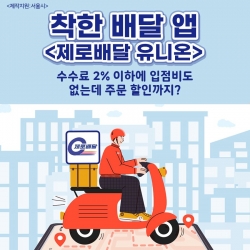
Public food delivery apps were unveiled for the first time in a food delivery market, monopolized by private applications such as Yogiyo, Baemin, and Coupang Eats. This public food delivery app is different from other services in that the government is in charge of management. Despite numerous discount promotions, its usage is minimal among citizens. Moreover, as the discount is compensated from local government taxes, the sustainability of such apps is questionable.
This project is ongoing not only in the capital regions, but also in local governments such as Chuncheon City. For Seoul, the Seoul Metropolitan Government (SMG) launched “Zero Delivery Union” service starting on Sept. 16. This service charges only zero to two percent on delivery commission fee to lessen the financial burden on restaurant owners. Normally, private delivery services’ delivery commission fee is five to 12 percent. Consumers who use this app to order delivery food can also benefit from the discounts. They can receive a seven to 10 percent discount on their order when using “Seoul Love Coupons” available through “Zero Pay.” “Zero Pay” is a direct transaction system that transfers money from the consumer’s account to the seller’s account when the consumer scans the seller’s Zero Pay QR code with one’s phone. This too is a service launched by SMG to help small retailers reduce their commission fees levied by credit card companies and banks to nearly zero percent. Zero Pay users can receive a 30 percent tax deduction.
From Nov. 11 to 17, Zero Delivery Union initiated its third promotion event. It will be offering a 20 percent discount on orders placed on designated delivery apps. Also, it will give customers a maximum of 50,000 won discount on purchases made with ‘Seoul Love Coupons’ on seven apps including Ddingdong, Mukkebi and Noljang. The Seoul Love Coupons are issued by individual district offices to increase sales of small local businesses.
When ordering a 22,000 won chicken in Seodaemun-gu through the app, a total 4,000 won discount was given. However, this discount was compensated from local government budgets, which is why consumers believe this app cannot be stable in the long run. Other than the immediate discount, they see no merits in using public delivery apps when private delivery apps already provide them with wider ranges of menus and discount events.
Reporter Choi Jin-hong from Economic Reviews, shared his views on this new service. Choi contended that the government’s intention in this private delivery service market is not the ideal option to help restaurant owners in the long run. Since the discount promotion cannot be permanent, the success of this app lies in its sustainability. If the promotion event does not gather users, its service will no longer be valuable therefore giving no financial help to restaurant owners.
Ko Yu-seon, a sophomore in Scranton Honors Program, shared her experience using ‘Incheoneum,’ an app which also provides cheaper delivery service in Incheon when paying with local currency. She mentioned that an immediate cashback system is convenient as the service is run with local currency. However, the lack of franchises in the service results in her lack of restaurant options.
Currently the app is in its third month since the launching, with its progress yet to be determined. One definite thing is that even university students who use delivery apps frequently is unaware of this service. People have already adjusted to the current private delivery services, making it unnecessary for them to log into a new account despite its numerous discount promotions.

